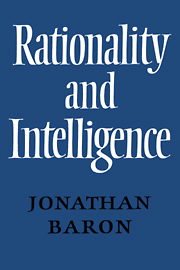Book contents
- Frontmatter
- Contents
- Preface
- 1 Introduction
- 2 Rational choices and plans
- 3 A theory of thinking
- 4 The scheme fleshed out: a decision–theoretic analysis of thinking
- 5 Conditions of effective thinking
- 6 Effects of rational thinking on the individual and society
- 7 The teaching of rational thinking
- References
- Index
3 - A theory of thinking
Published online by Cambridge University Press: 05 October 2009
- Frontmatter
- Contents
- Preface
- 1 Introduction
- 2 Rational choices and plans
- 3 A theory of thinking
- 4 The scheme fleshed out: a decision–theoretic analysis of thinking
- 5 Conditions of effective thinking
- 6 Effects of rational thinking on the individual and society
- 7 The teaching of rational thinking
- References
- Index
Summary
Consider an executive caught in a dilemma: How should she respond to her colleagues' unanimous decision to increase their expense accounts without informing the central office (which is unlikely to notice)? First, she wants to go along, imagining the nice restaurants she could take her clients to, but then she wonders whether it is right to do so, from the corporation's point of view. She is still tempted to go along, for it has been argued that other departments in the corporation are allowed higher accounts, and that increased entertainment and travel opportunities will benefit the corporation in various ways. However, she thinks of reasons against this view, such as the argument that any other department could do the same, on the basis of other flimsy excuses, and if all did so, the corporation would suffer considerably. (She makes use here of a heuristic or schema for moral arguments that she recognizes as one she has used before.) She considers reporting the decision to the central office, but rejects this both because of the personal danger it would involve and her feelings of loyalty to her colleagues. She decides not to go along, and to keep careful records of her own actual use of her expense account, because she has imagined what would happen if the scheme were in fact discovered.
- Type
- Chapter
- Information
- Rationality and Intelligence , pp. 84 - 129Publisher: Cambridge University PressPrint publication year: 1985



